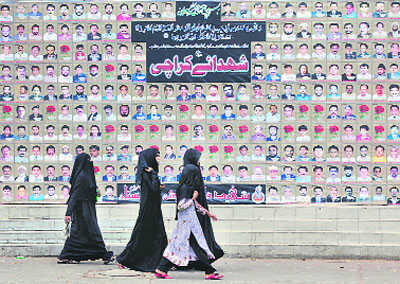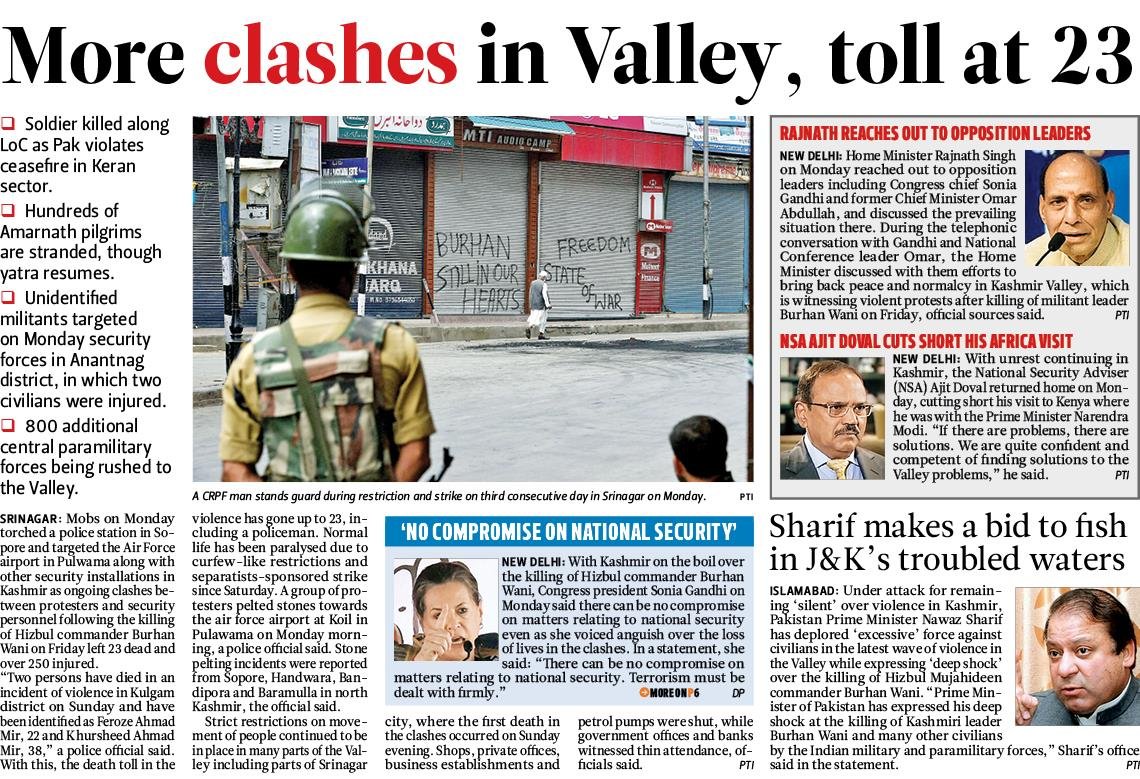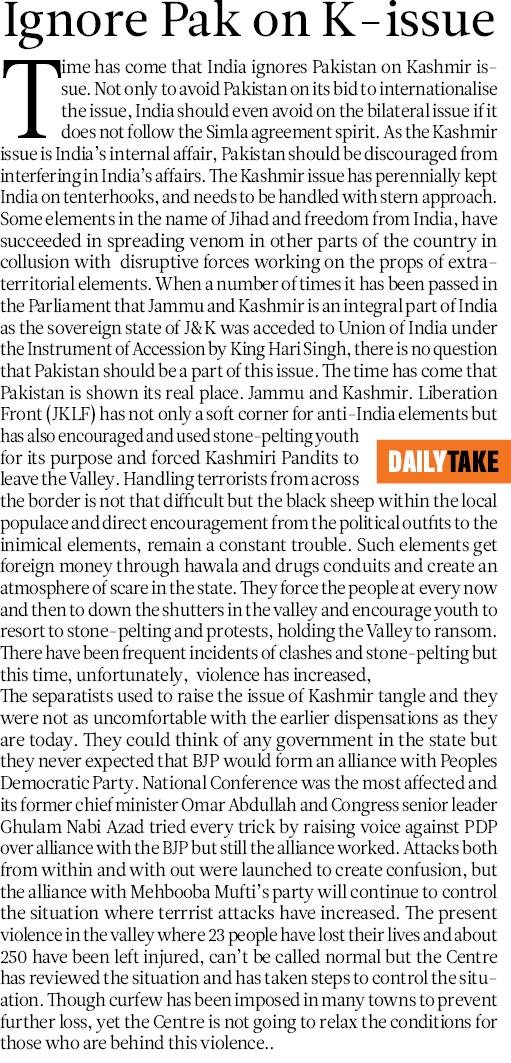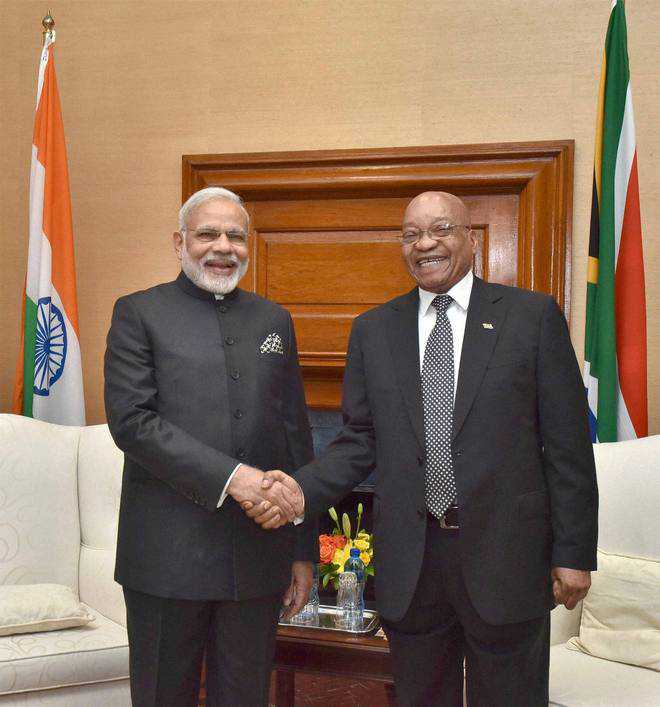Anwar Akhtar
A positive sign is that Pakistan is seeing a downturn in violence. If only the state would give up its obsession with ‘strategic depth’, ‘enemy is India’ and the good Taliban/bad Taliban equation.
 IN SHADOW OF DEATH: Women walk past a wall with portraits of people killed in a 2013 bombing in Karachi. REUTERS
IN SHADOW OF DEATH: Women walk past a wall with portraits of people killed in a 2013 bombing in Karachi. REUTERSHOW do you measure social progress in Pakistan? Where to begin? The economy? Growing according to some indicators. Property speculation? Also up, especially in Karachi, Lahore and Islamabad.A quick look at Pakistan’s many social ills — inequality, poverty, street children, gender inequality, law and order breakdown, violence against women, corruption, weak governance — tells you to spin around Clinton’s famous line. It’s not just the economy, stupid. It’s more than that.So how do you measure social progress in Pakistan? Something a colleague has been asking me for a while, given my work on The Samosa media project on human rights and culture in Britain and Pakistan. That colleague is Michael Green, director of the www.socialprogressimperative.org. This organisation has now gone further in answering this question, for all countries, with their annual Social Progress Index (SPI).The 2016 SPI has confirmed just how bad things are in Pakistan. It defines social progress as: “The capacity of a society to meet the basic human needs of its citizens, establish… building blocks… to enhance and sustain the quality of their lives… reach their full potential.”Awful news for Pakistan. Of 133 countries in the Social Progress Index for 2016, Pakistan ranks 113th. India is 98th and Bangladesh 101st. The ranking for tolerance and inclusion is even worse — Pakistan comes 132nd of 133.As someone with family in Pakistan, who has spent a lot of time in Pakistan and has a lot of love for Pakistan, I try to take the glass-half-full scenario. Karachi is a great economic engine, a megacity of huge potential. I’m full of admiration for countless welfare and charitable networks — Edhi Foundation, the Citizen’s Foundation, Human Rights Commission Pakistan, KVTC Karachi, Simorgh Women’s Welfare Project, Azad Street Children Welfare and Care Pakistan, to name a few — that work tirelessly to alleviate poverty, provide education and justice for the poor.The message from the SPI table for 2016 is terrible. Pakistan is staring into the abyss, a perfect storm of rapid population growth, social injustice, a huge street children population (estimated by the UN at 1.5 million), gender inequality, institutionalised state violence against women and chronic lack of economic opportunities for most people. Yes there’s a growing middle class, but in a county of 200m, too many are left out. The 2016 SPI has confirmed worst fears about how bad things are in Pakistan. Its evidence-based analysis makes difficult reading for those who care about Pakistan. This has to be seen in context. It is hard to plan transport, education and health provision when the Taliban and other hate-fuelled sectarian groups are waging war across the country.There may soon come a point where it becomes impossible to turn things around unless action is taken to address the immediate risks to Pakistan’s future as a state — poverty, lack of education, sectarian hatred and so on. How do you develop transport infrastructure, national schools programme or national health provision in such circumstances?A positive sign, as recently stated, is that Pakistan is seeing a downturn in the violence. Only if the state would stop its failed strategy of ‘strategic depth’, ‘enemy is India’ and the good Taliban/bad Taliban equation. Those in power, the military, billionaire oligarchs, and politicians need to understand that Pakistan is nearing the tipping point to becoming a failed state.There is criticism of Pervez Musharraf’s period as president, including outrageous attacks on civil society and abuse of democracy that ultimately led to his failure. One thing he at least tried — and I am not sure if the current leadership is — was a plan to tackle poverty, the educational crisis and other social ills.What would such a plan entail today? I think it involves raising a most sensitive issue in Pakistan. The country’s military expenditure in 2015 was $9.5 billion. India spent over $30bn in 2016. Nearly all this money goes to the West. It is colonisation by another method. Until this Dr Strangelove madness ends and both countries focus on education, trade, social welfare and peaceful relations, the annual SPI will I fear make ever more upsetting reading for Pakistan. A huge step in the right direction would be to reduce expenditure on missiles and increase it for education, health, housing and transport. Another is for the state to stand against the hate messages against women and minorities in Pakistan, promoted by sectarian parties in Pakistan, by tackling violence against women and protecting minority rights.The writer is director of www.thesamosa.co.uk, a culture and politics site with a focus on Britain and South Asia. (By arrangement with Dawn)









































































